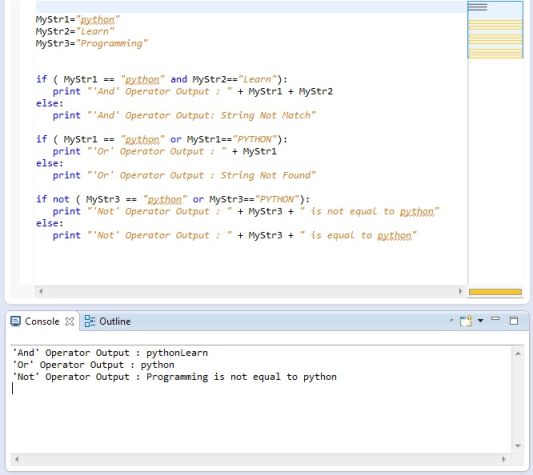

language = input("Please enter your favorite programming language: ") So, the condition will check whether the value stored in the variable language is equal to Python.įor this, you use the equality operator( = ) to check if the value stored in the variable language is equal to the string Python. If the user enters Python as their favorite language, then and only then, I want to print a message to the console saying that this is the correct answer. I want to prompt the user to enter their favorite programming language and store their answer in a variable named language. Next, let’s see an example of an if statement in action. What Is An example Of An if Statement in Python? If the expression evaluates to False they will not run. These lines will run if and only if the expression evaluates to True.
#MULTIPLE OR STATEMENTS PYTHON CODE#
Lastly, write any lines of code statements.This level of indentation is how Python knows that the code statements you will write are associated with the if statement. For example, when using the Visual Studio Code editor with the Python extension, right after you write the colon from the previous step and hit Enter, it will automatically indent your code with the right level of indentation. Many code editors will do this automatically for you. On a new line, add one level of indentation.A Boolean value will be an expression that evaluates to True or False. You leave a space and then add a Boolean value.You start the if statement using the if keyword.

#run this code if expression evaluates to True The general syntax for an if statement in Python is the following: if expression:

#MULTIPLE OR STATEMENTS PYTHON HOW TO#
How to Create an if Statement in Python - A Syntax Breakdown If it doesn’t, then don’t run this code at all. So, essentially, an if statement says: "Only run the following code once if and only if this condition evaluates to True. A Boolean expression can only be one of two values – True or False. Specifically, you will learn how to write if, if else, and elif (also known as else if) statements in Python.Īn if statement is also known as a conditional statement, and conditional statements are a staple of decision-making.Ī conditional statement takes a specific action based on a check or comparison.Īll in all, an if statement makes a decision based on a condition. In this article, you will learn how to write conditional statements in Python. Conditional statements are helpful for decision-making and are a core concept in all programming languages.


 0 kommentar(er)
0 kommentar(er)
